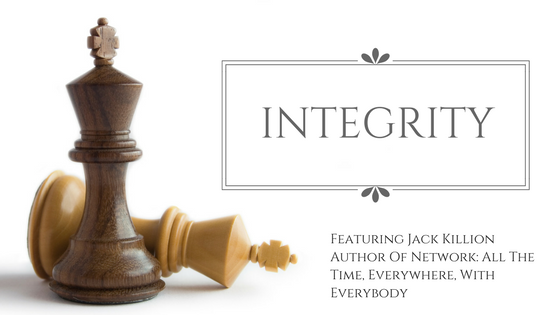
Integrity is earned by being honest, ethical, accountable, consistent and delivering on commitments. Having integrity means that your actions are in line with the values and beliefs you espouse. No matter how difficult the going, you will not be swayed from taking the right path, as determined by the ethics you embrace and your moral compass.
We asked Jack Killion (see here for Jack's bio) about his observations on integrity in the industry and what leaders can do to create a climate to encourage personal integrity.
 Here's what he said.
Here's what he said.
"Leaders create a culture of integrity in their organizations through their actions, both personal and work related, and much less so, or not at all, through their words.
People pay close attention to the behavior of those leading them. Leaders have multiple choices every day to demonstrate their integrity (or lack of) in the ways they handle people, issues and challenges.
Integrity shows up in the ways that leaders relate and deal with their families and friends, partners, employees, suppliers, customers and other stakeholders. Are they open? Are they fully transparent? Are they honest? Are they fair? Do they use the power of their position the right way?
The lack of integrity is always transparent and can be a killer characteristic with a leader trying to develop and grow a solid, successful organization. And integrity does not come with a switch. A leader either does or does not act with integrity. And a leader with clear integrity acts with integrity all the time, not just when it is easy and convenient.
Many years ago I saw a client business leader act with real integrity when it was painful to do so. A few months earlier he had taken over a failing family owned manufacturing business when his father, the founder passed away. On the day I refer to, a team of three from a mid-west based Fortune 500 corporation was in the area and wanted to stop in to meet the new management team. My friend and the head of the company had not previously been involved in the company and knew little about the customer base or the projects that the company worked on. Toward the end of this “getting to know you” meeting the visitors commented that their most recent experience (about 18 months prior) with the company had been poor. They commented about the poor quality of the work for which they had paid $75,000 (back when that was a lot of money) and had never been able to resolve the issue with the Founder.
My friend said he wished he could see first-hand the quality problems being described and was caught totally off-guard when they said they just happened to have it in the trunk of their rented car. Apparently the visit was not quite so spontaneous. My friend and new leader of the company sent some of his factory floor people out to get the item from the trunk.
When the piece was placed on the conference table the serious quality issues were apparent. My friend turned to the controller who was in the meeting and said “Gene, go get a check for $75,000 and give it to our visitors. Our company can’t survive without standing behind our work. Gene left and a few minute later the conference room phone rang. It was Gene asking to speak to my friend outside the meeting. When they met he told the new owner/leader that the company had almost no cash and very little in the way of receivables. The check would bounce. Gene was told to cut the check anyway. When he came back into the conference room with the check. My friend handed the check to the three visitors and told them the company had no cash so they would have to sit on the check for a few weeks until he could round up enough to cover it. They were thrilled with how the situation was handled and agreed to hold the check until they got word to cash it.
Before the visitors left the meeting they asked the new leader and his team to give them a proposal to build a new equipment system. The proposal turned out to be for over $1 million, the largest order in the company’s history, by far. A month later the company was awarded the order. The leader’s integrity was a key factor in the customer’s decision and set the tone of how the company would be run under new ethical leadership."
Jack's take away on leadership integrity boils down to:
* it has to be obvious and 100 percent in both the leader’s professional and personal life.
* it always turns out to be visible to all stake holders
* it means a leader either has it or she/he doesn’t
* any lack of integrity will always come back to bite
* the lack of integrity will drive the good performers (the ones with career options) out of the organization, leaving behind the underperforming, non-motivated employees treading water until their next career opportunity pops up.
Have the courage to say no. Have the courage to face the truth. Do the right thing because it is right. These are the magic keys to living your life with integrity.
- W. Clement Stone


